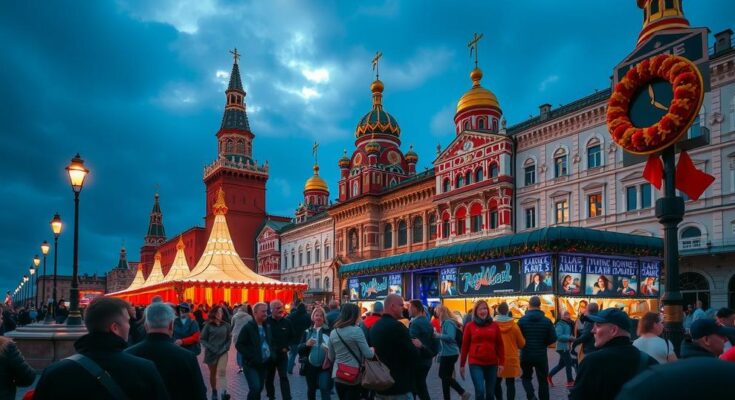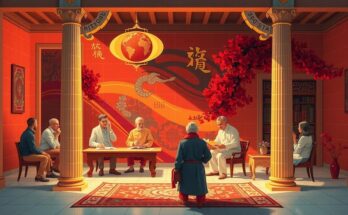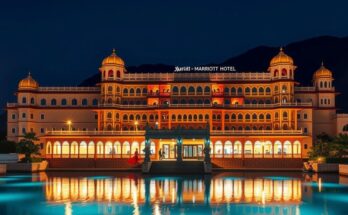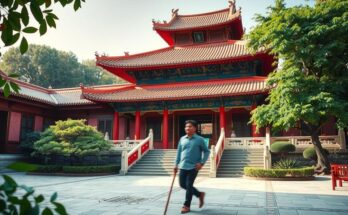Moscow has reemerged as a prominent tourist destination, attracting 2.3 million foreign visitors in 2023, predominantly from China, Turkey, India, and Iran. Cultural festivals are driving this growth, with projections indicating that by 2030, 14% of tourists will come specifically for events. The city’s vibrant offerings not only enchant tourists but also help residents reconnect with their heritage. With a growing portfolio of seasonal events, Moscow is redefining itself as a hub for cultural experiences year-round.
In recent years, Moscow has transformed into a vibrant destination for international travelers, welcoming 2.3 million foreign visitors in 2023. Significant numbers are emerging from China, Turkey, India, Iran, and the UAE, exceeding pre-pandemic visitor levels. As 2024 unfolds, early statistics signal a promising trend, with nearly half a million foreigners exploring the city in the first quarter alone, showcasing a remarkable 40% increase from the previous year. Moscow’s allure lies not just in its famous landmarks—like the imposing Kremlin and colorful St. Basil’s Cathedral—but also in its thriving cultural scene. The city buzzes with grand festivals, art exhibitions, and energetic street life, providing visitors a heady mix of history and modern vibrancy. This rich cultural tapestry stitches together unforgettable experiences for tourists, whether they are discovering Moscow for the first time or returning to rekindle cherished memories. One pivotal aspect of this renaissance is Moscow’s focused investment in event-based tourism. Evgeny Kozlov, Chairman of the Moscow City Tourism Committee, emphasizes that enhancing event tourism is a primary goal moving forward. Projections suggest that by 2030, 14% of all tourists—around 7.3 million—will visit specifically for cultural festivals and major events, reinforcing the city as a global cultural hotspot. Evgeniya Sumina, from the Project Office for the Development of Tourism and Hospitality, highlights how festivals entice travelers seeking unique experiences that deepen their connection with the city. These events create vibrant moments that resonate with tourists and help locals see their city with new eyes. “Impressions are the capital’s resource,” said Sumina, reflecting the significance of these engagements in enriching the city’s atmosphere. Moscow has showcased its potential with remarkable events such as the International Exhibition Forum “Russia,” captivating millions with its interactive displays from across its regions. This forum was a cultural feast that drew 18.5 million attendees, illustrating the city’s capability to host influential gatherings. Furthermore, initiatives like the summer festival “Territory of the Future” combine cultural and educational activities, celebrating Moscow’s forward-thinking spirit while enhancing its position as an event-centric city. Winter was once overlooked in Moscow, but it is now blossoming into a sought-after tourist season. The “Journey to Christmas” festival enchants the streets with a fairytale atmosphere filled with performances and culinary delights, drawing visitors eager for a magical winter escape. Another highlight is the “Moscow Tea Time” festival, reflecting the city’s deep-rooted tea culture while inviting visitors to partake in its historical traditions and sumptuous tastings. Moreover, the recent Chinese New Year celebration marked a thrilling chapter in Moscow’s cultural narrative. This vibrant event showcased over 300 activities featuring acrobats, martial arts, and folk music, allowing attendees to experience the rich tapestry of Chinese culture in an exuberant setting. Such community-centered festivals further illustrate Moscow’s dedication to inclusivity and cultural diversity. Moscow’s festival calendar keeps expanding, with perennial favorites like “Easter Gift” and “Moscow Spring” enhancing the off-peak seasons. These events thrive under the support of local authorities and tap into innovative ideas that enrich each cultural expression. As the city continues to prioritize its event scene, Moscow is steadily redefining itself as a multifaceted tourist haven brimming with artistry and tradition. Moscow’s festivals are more than mere attractions—they unlock the city’s essence, blending heritage with contemporary charm, and enticing both visitors and locals alike. These experiences etch lasting memories while nurturing a deeper appreciation for the city’s rich history and vibrant culture, inviting tourists to return time and again.
Moscow has recently experienced a significant resurgence in tourism, notably driven by a diverse calendar of festivals and cultural events. This strategic shift has positioned the city as a top destination, attracting millions of foreign tourists. As the tourism landscape evolves, Moscow is witnessing not only an influx of international visitors but also a rejuvenated interest from its residents, who are rediscovering their city through dynamic cultural experiences.
The renaissance of Moscow as a prime tourist destination is fueled by its rich tapestry of festivals and cultural events that resonate with a broad audience. From historical explorations to contemporary celebrations, the city is carving out a reputation as a vibrant hub of creativity and community. This evolution in tourism is set to shape both its future and the experiences offered to millions of visitors. Ultimately, Moscow’s blend of tradition and innovation captivates hearts, ensuring these impressions linger long after the journey ends.
Original Source: www.news18.com



